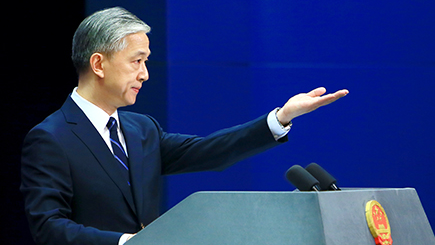Editor's note: Bobby Naderi is a journalist, guest contributor in print, radio and television, documentary filmmaker and member of the Writers Guild of Great Britain. The article reflects the author's opinion, and not necessarily the views of CGTN.
The Trump administration officials seem intent on deliberately dismantling decades of political, economic, social, cultural, academic and scientific engagement between the United States and China. It's not hard to see why.
They cannot stand the idea that no matter how hard they beat and pepper-spray the Sino-American relations – banning Chinese technology, sanctioning officials, closing consulates, firing academics and researchers, showing the flag in the South China Sea – they won't succeed in achieving their goal of setting the stage for a new era of confrontation.
Their many other confrontational foreign policy goals also failed because the deep-rooted relations between the two economic powers didn't start with the Trump administration. Nor would they end with the Trump administration. There is no new cold war or cold confrontation here, and certainly no fundamental and ideological crusades between the two economies.
Long before the pandemic, the U.S. economy was in trouble amid a surging government and consumer debt, global economic downturn, and foreign policy turmoil. Team Trump is still fighting with everything and everyone on the planet. This is a serious problem that limits possible economic recovery that no one in the high command is currently talking about. And it has nothing to do with China.
Anxious, however, to scare Americans into supporting their hostile rivalry, as opposed to a serious policy reality, and before many voters make their decision on November 3 the Election Day, the Trump administration wants everyone to believe that China is also a real threat to dominate the future, bent on making the 21st century into the Chinese century.
Ratcheting up tensions even more, other daily screeds consist of China is gaming the U.S. and waiting for the right opportunity to push Western countries under the bus.
On that note, it cannot be stressed enough that many American and Western scientific-academic institutions, as well as businesses and the elite refuse to buy this false narrative. They view China, the world's second largest economy, as a trustworthy partner. They view their trade and economic relations with China as fundamental to their own growth and prosperity. They don't seem worried, and they don't really have good reasons to be.
On balance, China's foreign policy is pragmatic and fundamental to the current globalization trend, in which mutual benefits is the bottom line. This novelty with the policy of promoting win-win cooperation through international institutions and mechanisms meets mutual needs and promotes innovative and inclusive cooperation.

Chinese Foreign Ministry Spokesperson Wang Wenbin speaks at a regular press conference, July 24, 2020. /fmprc.gov.cn
Chinese Foreign Ministry Spokesperson Wang Wenbin speaks at a regular press conference, July 24, 2020. /fmprc.gov.cn
It protects interests through the furtherance of mutually advantageous relations and is largely itself a product of global development and governance. It takes effort to dispute otherwise.
Making a similar point, there are many benefits of collaboration in manufacturing. U.S. companies and businesses spent a fortune to establish their global supply chains in China. It doesn't take a mathematician to add this simple sum that they would have to spend even more to re-establish them elsewhere. These factories were also built for China's consumer market of over 1.4 billion people. It makes no economic sense to tear them down.
Decoupling from China might be conceivable except in the numbers. It could lead to unpredictable challenges and uncertainty. Even if it happens in the current escalatory spiral, it won't mean the end of manufacturing in China.
China is the biggest manufacturer in the world. It encourages bilateral relations between private and semi-public bodies in the U.S., such as trade unions and professional organizations. More important, China is an academic power and U.S. institutions need its scientific achievements and products.
Here is one more thing. Attempts by the Trump administration to tarnish China's image in the international community has revolved around questioning the character of China's engagement in the South China Sea, where it shares the basic values of international law with neighbors.
What is known is that China remains both an economic partner and a force to the stability of the region. In some sense, the Trump administration officials contest their differing interests and roil regional order, but they are unable to convince the world community that they have a right in the territorial sovereignty of the South China Sea, or in China's inalienable rights formed in the course of history.
To put it bilaterally, the current attempts by the Trump administration to cut off the whole relationship and manufacture new national security threats, or tarnish China's global image is undeniably wrongheaded and predestined.
In addition to many other countries and international partners, many American businesses and institutions favor more respect, more collaboration, more integration, more trust and more economical relations with the ancient civilization of China. There is hope in all of this.
(If you want to contribute and have specific expertise, please contact us at opinions@cgtn.com.)